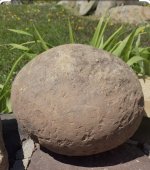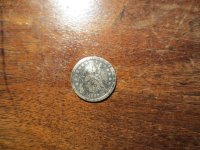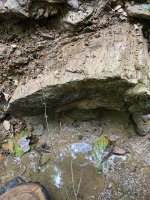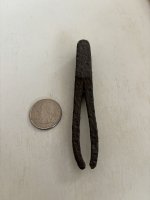The Enigmatist
Jr. Member
Guys- I need someone to answer at least some of these questions concretely. I'm a Virginian but I'm not in the country at the moment and cannot do the work in-person (Lynchburg is just 2-hrs away normally)
Apparently James B. Ward was a member of the Dove Lodge #51 in Richmond between 1862 and 1867. It is believed his membership expired or lapsed and he was dismissed. From what I've been able to research however, the Lodge was burned down during the Union assault in 1865, so literally everyone in the Lodge was suspended. My question is- did Ward ever re-join another Lodge or was that the entirety of his Masonic experience?
A similar question about John W. Sherman. I'm having a very hard time connecting him in literally any way to TBP except to note that he was responsible for producing copies. That doesn't seal the deal for me. If however it can be proven he was a Mason I might be swayed. Was he? When and where?
Were any other family members in the connected Ward/Otey/Risque/Sherman/Buford/Mitchell/Morriss clan prominent Freemason at the time the Papers were written (which I'm saying were between 1880 and early 1884)?
One last one....
I believe the unknown author of the Papers crafted his persona around a man who was very well known in Lynchburg at the time of the Paper's release. This doesn't imply the Papers were written by this person but only that the author wanted others to think he was responsible. This person was Francis B. Deane III, owner of the Deane Foundry.
Deane III inherited this business from his father, Francis B. Deane Jr after his father's death in 1867. The father, Deane Jr was responsible for the creation of the famous Tredegar Iron Works in Richmond and was a VA Commonwealth State Representative. Deane Jr was also on Jeff Davis' privy council during the War.
The Deanes lived in the Diamond Hill section of Lynchburg and were considered highly-affluent.
In 1862, Deane's company was given a massive munitions contract which required his son, Francis B. Deane III to leave Lynchburg for Richmond in order to run the business. This coincides with the statement in the TBP in which the author said he had to attend to matters of utmost importance in Richmond.
Additionally, why would Morriss..in the middle of the War, gifts just one man, and one Morriss considered young, the secret of the Beale treasure? Morriss would have only done this if he knew this man would not see combat- and Deane III, only 27 years old in 1862, never saw combat due his worth as a munitions man.
Francis' younger brother John C. Deane was also killed at the Battle of Phillipi in 1861, in one of the first skirmishes in the War....thus being now the only surviving son of a member of Jeff Davis' privy council likely ensured Deane III would never here a gun fire. All of this would have been known info and gossip to Lynchburgers of the 1880s.
The Deane Foundry flourished during the War but once the Confederacy was lost the Union occupiers shut it down for roughly a year after the War's conclusion. It was re-opened in roughly 1867 (the same year Deane jr. died), to provide flywheels and train parts, but by the late 1870s the Foundry was floundering financially and closed in bankruptcy in roughly 1879.
In Nov of 1880, a Philadelphia conglomerate purchased the foundry and re-lit the furnaces. It would not be hard for Lynchburgers to say to themselves...."Hmm...who do we know who didn't see action in War, was born of affluence but squandered it all?" It would not be difficult to think immediately of Deane...and that the real reason Deane had squandered his father's business was not due to misfortune but inattention caused by a devotion to solving the Beale Ciphers instead of focusing on family and work.
Deane III's running of the company his father had given him was a failure and was followed by a stint as the president of the Glamorgan Co (a small foundry which specialized in pipe and fire hydrants). Deane quit after a year however citing ill health. Again, all of this too would have been well-known to Lynchburgers of the time period.
Although he never worked again health did not appear to an issue as he lived until 1903, He was not buried in his family's plot (as his father and grandfather were) in Cartersville (called the "Deanery" and where Deane III was born) but in Lynchburg.
Very interestingly, Deane III had only one son....Thomas J. Deane- a name extremely similar to the TBP protagonist.
My question is....was Deane III a Freemason? If he was, then he may have indeed written the Papers. Otherwise, it appears someone used his life as a template.
Why I ask about Masonic memberships is due to what I've found within the contents of both the narrative and the ciphers- material which clearly and overtly Masonic.
I can't pull the trigger and publish this yet however until I can wrap up a couple loose ends...and this is by far the biggest.
Were any of the "players" or their close associates/family members and Francis B. Deane III, Freemasons during the time of the TBP publication?
Apparently James B. Ward was a member of the Dove Lodge #51 in Richmond between 1862 and 1867. It is believed his membership expired or lapsed and he was dismissed. From what I've been able to research however, the Lodge was burned down during the Union assault in 1865, so literally everyone in the Lodge was suspended. My question is- did Ward ever re-join another Lodge or was that the entirety of his Masonic experience?
A similar question about John W. Sherman. I'm having a very hard time connecting him in literally any way to TBP except to note that he was responsible for producing copies. That doesn't seal the deal for me. If however it can be proven he was a Mason I might be swayed. Was he? When and where?
Were any other family members in the connected Ward/Otey/Risque/Sherman/Buford/Mitchell/Morriss clan prominent Freemason at the time the Papers were written (which I'm saying were between 1880 and early 1884)?
One last one....
I believe the unknown author of the Papers crafted his persona around a man who was very well known in Lynchburg at the time of the Paper's release. This doesn't imply the Papers were written by this person but only that the author wanted others to think he was responsible. This person was Francis B. Deane III, owner of the Deane Foundry.
Deane III inherited this business from his father, Francis B. Deane Jr after his father's death in 1867. The father, Deane Jr was responsible for the creation of the famous Tredegar Iron Works in Richmond and was a VA Commonwealth State Representative. Deane Jr was also on Jeff Davis' privy council during the War.
The Deanes lived in the Diamond Hill section of Lynchburg and were considered highly-affluent.
In 1862, Deane's company was given a massive munitions contract which required his son, Francis B. Deane III to leave Lynchburg for Richmond in order to run the business. This coincides with the statement in the TBP in which the author said he had to attend to matters of utmost importance in Richmond.
Additionally, why would Morriss..in the middle of the War, gifts just one man, and one Morriss considered young, the secret of the Beale treasure? Morriss would have only done this if he knew this man would not see combat- and Deane III, only 27 years old in 1862, never saw combat due his worth as a munitions man.
Francis' younger brother John C. Deane was also killed at the Battle of Phillipi in 1861, in one of the first skirmishes in the War....thus being now the only surviving son of a member of Jeff Davis' privy council likely ensured Deane III would never here a gun fire. All of this would have been known info and gossip to Lynchburgers of the 1880s.
The Deane Foundry flourished during the War but once the Confederacy was lost the Union occupiers shut it down for roughly a year after the War's conclusion. It was re-opened in roughly 1867 (the same year Deane jr. died), to provide flywheels and train parts, but by the late 1870s the Foundry was floundering financially and closed in bankruptcy in roughly 1879.
In Nov of 1880, a Philadelphia conglomerate purchased the foundry and re-lit the furnaces. It would not be hard for Lynchburgers to say to themselves...."Hmm...who do we know who didn't see action in War, was born of affluence but squandered it all?" It would not be difficult to think immediately of Deane...and that the real reason Deane had squandered his father's business was not due to misfortune but inattention caused by a devotion to solving the Beale Ciphers instead of focusing on family and work.
Deane III's running of the company his father had given him was a failure and was followed by a stint as the president of the Glamorgan Co (a small foundry which specialized in pipe and fire hydrants). Deane quit after a year however citing ill health. Again, all of this too would have been well-known to Lynchburgers of the time period.
Although he never worked again health did not appear to an issue as he lived until 1903, He was not buried in his family's plot (as his father and grandfather were) in Cartersville (called the "Deanery" and where Deane III was born) but in Lynchburg.
Very interestingly, Deane III had only one son....Thomas J. Deane- a name extremely similar to the TBP protagonist.
My question is....was Deane III a Freemason? If he was, then he may have indeed written the Papers. Otherwise, it appears someone used his life as a template.
Why I ask about Masonic memberships is due to what I've found within the contents of both the narrative and the ciphers- material which clearly and overtly Masonic.
I can't pull the trigger and publish this yet however until I can wrap up a couple loose ends...and this is by far the biggest.
Were any of the "players" or their close associates/family members and Francis B. Deane III, Freemasons during the time of the TBP publication?
Amazon Forum Fav 👍
Last edited:


 Coffee...?
Coffee...? 







